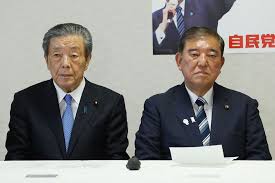News Flash
News Flash

TOKYO, Sept 3, 2025 (BSS/AFP) - Opponents of Prime Minister Shigeru Ishiba in Japan's ruling party sought on Wednesday to rally support for a new leadership election, with several party heavyweights reportedly turning on the embattled premier.
Ishiba, 68, took the helm of the long-dominant Liberal Democratic Party (LDP) last year and has since lost his majority in both houses of parliament, most recently in upper chamber elections in July.
On Tuesday, four senior LDP figures including secretary general Hiroshi Moriyama offered to resign, but Ishiba said he still had work to do as leader.
"I will make appropriate decisions at an appropriate time. But first and foremost, I believe this means dedicating all my efforts to fulfilling what the people truly want me to accomplish," he said.
"I won't run away from taking responsibility," he said, adding he had "no intention at all to cling onto my position" if it became untenable.
The LDP is currently surveying its 295 lawmakers and 47 regional officials across Japan on whether to hold a new leadership contest, in a process due to conclude on September 8.
Those backing the idea include influential former prime minister Taro Aso, according to national broadcaster NHK and the top-selling Yomiuri Shimbun newspaper.
Ishiba's most prominent rival Sanae Takaichi, seen as a hardline nationalist, all but said on Tuesday that she would seek a contest.
"In any organisation, when things don't go well, I have my own thoughts about how leaders should take responsibility," she told reporters.
- Poll boost -
Recent opinion polls suggest rebounding support for Ishiba's cabinet, with voters less than keen on the hawkish Takaichi, runner-up in the last leadership election in 2024.
A Nikkei survey on Sunday put Takaichi as the most "fitting" successor to Ishiba but 52 percent of respondents said a leadership contest was unnecessary.
Many LDP lawmakers are still unsure and are asking themselves whether supporting Ishiba might translate into receiving senior government or party assignments, said Ken Takayasu, professor at Waseda University.
"LDP politicians might sound ideological and some are but they are more affected by the prospect of a ministerial position or a senior LDP position," he told AFP.
"Japanese politics often moves with mood, atmosphere, which is very much irrational," he said.
The focus for now is on whether Ishiba can persuade Moriyama, a powerful party veteran who has worked with opposition parties to push through legislation, to stay.
Moriyama's departure would be a serious blow to Ishiba, but in leaving the decision to the prime minister "he could stay if asked," said Koya Miyamae, senior economist at SMBC Nikko Securities.
"If Moriyama can stay in the leadership circle, that is a win for (Ishiba), but if Moriyama leaves totally, at this moment that sounds a real crisis," said Takayasu.
Miyamae added that a faction led by former prime minister Fumio Kishida seems to hold the "casting vote" on whether to hold the leadership election.